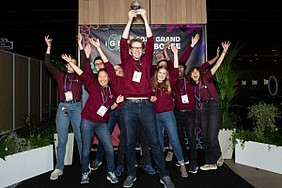The iGEM Munich team just announced that they won a Gold Medal for the project SpecifiCAR at the iGEM 2022 competition and are among the TOP 10 out of the 180 undergraduate projects. Furthermore, the team, consisting of students from the Technical University of Munich (TUM) and the Ludwig Maximilians University of Munich (LMU), were honored with the award for Best Software Tool and the nominations for Best Therapeutics Project, Best Model, Best Wiki, and Best Presentation. At the Grand Jamboree in Paris, iGEm Munich presented the 1-year project outcome of improving the specificity of CAR T-Cell therapy using tumor microenvironment factors. 3000 people from 45 countries presented over 350 projects, all striving to make the world a better place by using the versatile toolbox of synthetic biology.
The iGEM Munich team won a Gold Medal at the international Genetically Engineered Machine (iGEM) Competition 2022 and are among the TOP 10 out of the 180 undergraduate projects. The project SpecifiCAR, which aims at improving the specificity of CAR T-Cell therapy using tumor microenvironment factors, was also honored with the award for Best Software Tool and the nominations for Best Therapeutics Project, Best Model, Best Wiki, and Best Presentation.
The international Genetically Engineered Machine (iGEM) Competition is the biggest student competition in synthetic biology in the world. IGEM Munich presented their work last week at the iGEM Grand Jamboree in Paris. This year, 350 teams of student scientists and engineers from 45 countries and regions worked creatively and tirelessly to push the boundaries of synthetic biology. The Giant Jamboree is the culminating event of iGEM's annual synthetic biology innovation competition for collegiate and high school students.
Improving the specificity of CAR T-Cell therapy
iGEM Munich invested 12 months work effort for project SpecifiCAR at the TUM Chair of Cellular Protein Biochemistry of Prof. Matthias Feige: Improving the specificity of CAR T-Cell therapy using tumor microenvironment factors. Chimeric Antigen Receptor (CAR) T-cell therapy is a well-known approach in personalized medicine, providing a promising attempt for fighting cancer diseases, but still having drawbacks by limited specificity and off-tumor responses causing severe side-effects in patients.
In the SpecifiCAR approach, the iGEM Munich team aimed at improving specificity of CAR T-cell therapy utilizing distinctive factors of the tumor microenvironment. This involved targeting acidic pH and CD8+ cell clustering around solid tumors, modern tools of the synbio toolbox to introduce an inducible loop facilitating quorum sensing of CAR T-cells and the development a pH control mechanism for CAR activation. Furthermore, a software tool was developed to streamline the design of the receptors and to help facilitate future projects involving CARs.
iGEM Munich successful in competing for years
The iGEM Munich team consists of both students from the Technical Universität München (TUM) and the Ludwig Maximilians Universität München (LMU). Combining the strengths of both, the team aims at competing with the top runners of iGEM. In 2017, 2018, and 2019 alone, the Munich team was a runner-up twice and winner once. To date projects have resulted in 5 publications, 2 patents, and a start-up (https://invitris.com/Invitris, Kilian Vogele).
iGEM Foundation fosters students to push the boundaries in synthetic biology
The International Genetically Engineered Machine (iGEM) Foundation is an independent, non-profit organization dedicated to education and competition, the advancement of synthetic biology, and the development of an open community and collaboration. iGEM’s biggest program is the iGEM Competition. The iGEM Competition gives students the opportunity to push the boundaries of synthetic biology by tackling everyday issues facing the world. Made up of primarily university students, multidisciplinary teams work together to design, build, test, and measure a system of their own design using interchangeable biological parts and standard molecular biology techniques. Every year nearly 6,000 people dedicate their summer to iGEM and then come together in the fall to present their work and compete at the annual Jamboree.
Each year, thousands of participants from all around the world design, build, and test biological systems to solve local problems that help tackle global challenges – from climate change and environmental degradation to sustainable agriculture, human health, and more. As part of the competition, participants explore the ethical, legal, social, economic, safety and security implications of their work, which is crucial for building safe and responsible projects that serve the public interest.
More than 60,000 people have participated in iGEM since it began in 2003.

